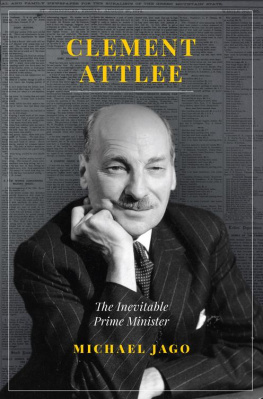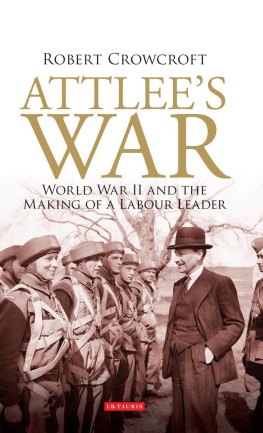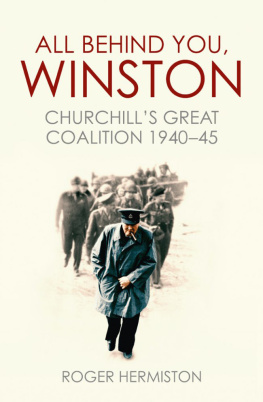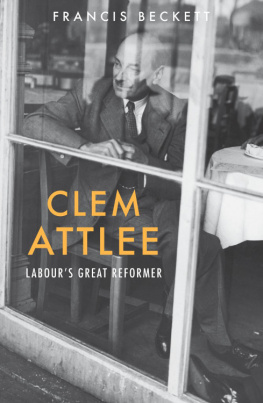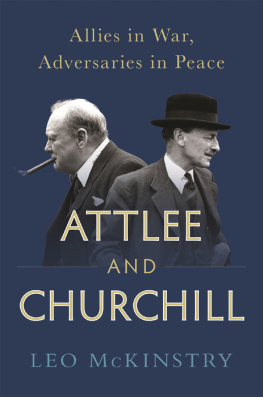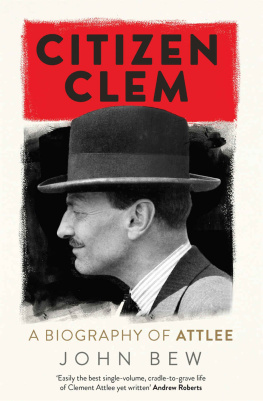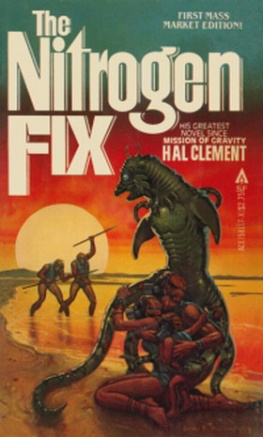Attlee Clement Richard - CLEMENT ATTLEE: the inevitable prime minister
Here you can read online Attlee Clement Richard - CLEMENT ATTLEE: the inevitable prime minister full text of the book (entire story) in english for free. Download pdf and epub, get meaning, cover and reviews about this ebook. City: Great Britain;Place of publication not identified, year: 2017;2014, publisher: Biteback Publishing, genre: Detective and thriller. Description of the work, (preface) as well as reviews are available. Best literature library LitArk.com created for fans of good reading and offers a wide selection of genres:
Romance novel
Science fiction
Adventure
Detective
Science
History
Home and family
Prose
Art
Politics
Computer
Non-fiction
Religion
Business
Children
Humor
Choose a favorite category and find really read worthwhile books. Enjoy immersion in the world of imagination, feel the emotions of the characters or learn something new for yourself, make an fascinating discovery.
- Book:CLEMENT ATTLEE: the inevitable prime minister
- Author:
- Publisher:Biteback Publishing
- Genre:
- Year:2017;2014
- City:Great Britain;Place of publication not identified
- Rating:3 / 5
- Favourites:Add to favourites
- Your mark:
- 60
- 1
- 2
- 3
- 4
- 5
CLEMENT ATTLEE: the inevitable prime minister: summary, description and annotation
We offer to read an annotation, description, summary or preface (depends on what the author of the book "CLEMENT ATTLEE: the inevitable prime minister" wrote himself). If you haven't found the necessary information about the book — write in the comments, we will try to find it.
CLEMENT ATTLEE: the inevitable prime minister — read online for free the complete book (whole text) full work
Below is the text of the book, divided by pages. System saving the place of the last page read, allows you to conveniently read the book "CLEMENT ATTLEE: the inevitable prime minister" online for free, without having to search again every time where you left off. Put a bookmark, and you can go to the page where you finished reading at any time.
Font size:
Interval:
Bookmark:
I am greatly indebted to a large number of people who have contributed in innumerable ways to the completion of this book.
Above all, members of the Attlee family have been generous with their time and helpful in correcting errors of emphasis and fact. Pre-eminent among these has been Anne, Dowager Countess Attlee (daughter-in-law), the keeper of the archive and the flame. Her comprehensive collection of photographs, memorabilia and memories provided many happy hours in her Clement room. I am also indebted to the 3rd Earl Attlee (grandson) for his hospitality and willingness, amid House of Lords business, to spend time with me. Additional help was provided by Air Vice-Marshal Donald Attlee (nephew), Tom Roundell Greene (great-grandson), Jo Roundell Greene and Jenny Lochen (granddaughters), and Charles Attlee (great-nephew), who helped me set the family wheels in motion.
The book has been read, either in its entirety or in part, by Dr Patricia Owens (University of Sussex), Dr Robin Darwall-Smith (University College, Oxford), Michael Parsons (University of Pau), Dr Daniel Lomas (University of Salford), Olivia Harris (Middle Temple), Chris and Frances Pye, Bryan Engler, Robin Martin, by Anne, Lady Attlee, and by long-suffering members of my family. Their help and suggestions have been immeasurable. Dr Darwall-Smith, archivist of Univ, additionally opened the University College archives for inspection. Naturally, any errors of fact or omission are mine alone.
Research was also greatly aided by Simon Fowler, formerly of the Public Records Office; Helen Langley, Rebecca Wall, Dr Anne Mouron, and the staff of the Special Collections Reading Room at the Bodleian Library; Julian Reid and Harriet Fisher, archivists at Corpus Christi College, Oxford; the Librarian and staff of Churchill College, Cambridge; Edmund King, late of Wadham College, Oxford; Sam Mallinson of Brasenose College, Oxford and Jon Roycroft of the University of Oxford; the Librarian of the Oxford Union; by Bill and Jean Whaley, who provide a home for authors visiting Oxford, and by Toby Parker, archivist at Haileybury College.
Additionally, in various ways, the following have provided invaluable input and support: Edward Cootes, Professor Jonathan and Sarah Dancy, Iain Harris and Juliet Jamieson, James and Dr Elizabeth Jago, Claire Jamieson, Major Dr Seth Johnston (US Army), Richard Savage, Jerry and Jane Scott, Robin and Amanda Shield and Mark Vandevelde of the Financial Times. Much of the book was written in France, where I must thank Benot Pelletier and Chantal Pourget for maintaining order in my house and affording the same respect for calm that they would have afforded Marcel Proust.
For help in locating photographs I must especially thank Will Carleton of Press Photo History. For help and permissions I am grateful to Anne, Countess Attlee; Michael Rhodes representing the Ernest Fawbert Collection; Charlie Masson-Smith, Chief Press Officer of Wandsworth Council; Colin Panter of Press Association Images; Mark Blumire of Alpha Press; Simon Flavin of the Daily Mirror; John Balean and Mark Dowd of Top Foto; Laura Wagg of PA Images; and Darryl Lundy of The Peerage.
As ever, I am in the debt of my agent, Andrew Lownie, and of Mick Smith and Olivia Beattie of Biteback Publishing who have provided encouragement and a remarkable degree of tolerance as deadline after deadline slipped by.
Somehow, in the midst of a heavy lecture schedule, my wife Carol has found time to read each chapter; her comments and suggestions have added felicity of expression and a transatlantic perspective to my efforts.
Finally, I must offer belated thanks to the late Edric William Hoyer Millar CBE and the late Thomas Simons Attlee for stimulating the interest of the author, then a twelve-year-old boy, in the 194551 Labour government. It is to the memory of those two outstanding gentlemen that I dedicate this book.
W hen I adduced the subtitle The Inevitable Prime Minister, my intention was to gainsay the myth that Clement Attlee came from nowhere, that his elevation in 1945 was an accident or electoral mistake. More than any party leader in the twentieth century, he earned his status, and more than any member of the War Cabinet, except Winston Churchill himself, he contributed, without a hint of partisanship, to the national cause.
Thus, given that Britain was at peace in 1945 and that the electorate wished for change, and given that Clement Attlee was the established leader of the party of change, it was hardly surprising that, after a decade in that role, he replaced the redoubtable Churchill at the helm.
Unsurprisingly, the word inevitable, applied to Clement Attlees path to Downing Street, drew a reaction of surprise from critics. John Bew pointed out that nothing is inevitable, and Jack Straw, in a comprehensive and sympathetic lecture to the Middle Temple in 2015, took issue with the word as though it somehow devalued the premiership of a remarkable, unique man.
Since 1945, the Churchill legend has waxed and waxed. That is hardly surprising as, absent that indefatigable pugnacity, the Second World War might have taken a very different course. That alone could be used to demolish the idea that the events of 1945 were inevitable.
But if we take the outcome of the war as established historical fact, consider the electorates desire for change in July 1945, and look back at the evolution of the Labour Party in the preceding two decades, the outstanding figure, the only electable leader, in place since 1935, was Clement Attlee. It was no accident or temporary wave of populism that ushered in six remarkable years of his leadership.
Within the Labour Party, moreover, not every observer agreed with that causality. Even as Attlee prepared to kiss hands with King George VI in July 1945, Herbert Morrison was agitating to replace him. Principally because of the unwavering support of Labours strong man Ernest Bevin, Morrisons machinations were circumvented. Not inevitable, perhaps, but when Violet Attlee drove their modest saloon car to Buckingham Palace, it was the correct, the only sensible outcome.
In a little under forty years, the Labour Party had developed from a fringe party that boasted one charismatic Member of Parliament to a movement that achieved a landslide victory with nearly twelve million votes and 393 seats in 1945. Along the way, the partys leadership had seen a variety of individuals and a shifting platform as Keir Hardie, George Lansbury and Ramsay MacDonald experimented with different ideological clothing. From the mid-1920s onwards, Attlee had been at the ideological and strategic centre of the party. His confirmation as leader in 1935 was, if not inevitable, logically entailed.
From 1935 to 1945 there was a single thread that dominated the course of events: how Britain would respond to the mounting territorial ambitions of Nazi Germany. Once again, Attlee was consistent, first as the Leader of the Opposition, later as a member of the War Cabinet and, from 1942, as a busy and massively supportive Deputy Prime Minister. Time and again, as Churchills missions kept him at Placentia Bay, Casablanca, Tehran, Yalta, it was Attlee who chaired the War Cabinet and corralled ministers support for the PM.
To his brother Tom he wrote that it is obviously futile to try to put on Sauls armour and that he was holding the baby and would not try to stretch the bow of Ulysses. His unimpeachable loyalty to the cause, first of the party, later of an embattled nation, uniquely qualified him to lead the party and the nation when the need arose.
From this sequence of events, this evolution of the Labour Party and the role of its leader, comes the statement that Attlees elevation was inevitable. Granted that events could have derailed that progress, granted that from 1940 to 1944 Britains fate itself hung in the balance, but on the premise that after Pearl Harbor the defeat of Germany was inevitable, no force could keep Labour from power. Ipso facto, Morrison and Laski notwithstanding, there was no movement powerful enough to keep Attlee from Downing Street.
Font size:
Interval:
Bookmark:
Similar books «CLEMENT ATTLEE: the inevitable prime minister»
Look at similar books to CLEMENT ATTLEE: the inevitable prime minister. We have selected literature similar in name and meaning in the hope of providing readers with more options to find new, interesting, not yet read works.
Discussion, reviews of the book CLEMENT ATTLEE: the inevitable prime minister and just readers' own opinions. Leave your comments, write what you think about the work, its meaning or the main characters. Specify what exactly you liked and what you didn't like, and why you think so.

